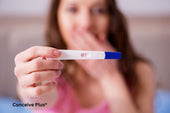Feeling Scared of Getting Pregnant Using Condoms Explained

Feeling scared of getting pregnant using condoms is completely natural, especially if you're new to using them or have doubts about their effectiveness. Condoms are among the most reliable contraceptive methods available, but no method is entirely foolproof. That little voice in your head wondering if something might go wrong? It's common, and you're not alone. Whether you're worried about a break, slippage, or human error, understanding how to have sex without getting pregnant and addressing these fears can help put your mind at ease.
You might be asking questions like are condoms safe enough to prevent pregnancy percent or even, can condoms stop pregnancy? These are important concerns. Let's talk about how effective condoms are, the best ways to use them, and how to reduce the chances of an unplanned pregnancy while using them.
Are Condoms Safe Enough to Prevent Pregnancy?
If you're wondering are condoms safe enough to prevent pregnancy, the answer is yes—they are one of the safest contraceptive options out there. Condoms work by creating a barrier that stops sperm from reaching the egg, reducing the likelihood of fertilization. But effectiveness relies heavily on correct and consistent use.
With perfect use, condoms are 98% effective. What does that mean? Out of 100 people using condoms perfectly over a year, only two would experience pregnancy. However, in real life, people are not perfect. Mistakes happen, like putting the condom on too late or not using it throughout intercourse. This drops the effectiveness to about 85%, meaning 15 out of 100 users could experience pregnancy in a year.
Factors like improper storage, expired condoms, or incorrect application can increase the chances of pregnancy with condom. To keep condoms working effectively, always store them in a cool, dry place, and check the expiration date before use [1]. Simple things like these make a big difference.
Can a Condom Get You Pregnant?
Does the thought can a condom get you pregnant cross your mind? Or maybe you've even wondered, can condom make you pregnant? It's not the condom itself, of course—it's how it's used. A condom can't make you pregnant, but incorrect use can allow sperm to bypass the barrier it's supposed to create.
For example, if the condom tears during intercourse, it's no longer effective. If it slips off or if it isn't worn properly, sperm could enter the vagina and potentially cause pregnancy. And yes, using expired condoms or condoms stored in hot or humid environments increases the chances of failure. These situations make the probability of getting pregnant with a condom higher [2].
It's also worth noting that pre-ejaculate, or pre-cum, may contain sperm. If a condom isn't worn before any genital contact, there's a chance sperm could reach the egg [3]. To avoid this, make sure the condom is applied as soon as sexual activity begins.
Can You Get Pregnant From Using Condoms?
If you're asking, can you get pregnant from using condoms or can you get pregnant from a condom, the short answer is yes, but it's rare if they're used correctly. Condoms are highly effective, but no contraceptive method is 100% guaranteed.
Most failures occur because of human error. For example, not leaving enough space at the tip of the condom can cause it to burst during ejaculation [4]. Using the wrong size condom can also lead to slippage or breakage. These issues increase the chances of getting pregnant with condom, even when you're trying to use protection.
To minimize risks, make sure to follow all usage instructions carefully. Practice makes perfect, and taking the time to learn proper application can save you from a lot of stress.
Can You Get Pregnant When Using a Condom?
The thought of can you get pregnant when using condom or can you get pregnant using a condom might keep you up at night. Condoms are effective, but they're not magical. If there's a mistake in how they're used, pregnancy is possible.
For example, using oil-based lubricants with latex condoms can weaken the material and cause it to tear. Not checking the condom for visible damage before use can also lead to problems. These mistakes might seem small, but they can have a big impact, increasing the likelihood of getting pregnant with a condom. Some people worry, can you get pregnant with a condom, even when using it correctly, but the risk is minimal if the condom is applied properly and used consistently throughout the entire act.
Consistency matters. Always wear the condom from the beginning of intercourse to the end, and make sure it stays intact. It might seem tedious, but these small steps go a long way in preventing an unplanned pregnancy [5].
Does Using Condoms Prevent Pregnancy?
Many people ask, do condoms prevent pregnancy, and the answer is yes—they are highly effective when used properly and consistently, making them one of the most trusted contraceptive methods. If you're wondering, does using condoms prevent pregnancy? The answer is also yes, but like any method, there are caveats. Condoms work effectively when used correctly, but misuse can lead to failure.
For those concerned about the pregnancy chance condom, consider pairing condoms with another method of contraception, such as spermicide or hormonal birth control. This dual protection approach significantly reduces the chances of pregnancy and adds an extra layer of security.
Remember, the more consistent you are, the better condoms will work. This is especially true if you're new to using them. It's normal to make small mistakes initially, but practice will help you become more confident over time [6].
Can You Still Get Pregnant With a Condom?
It's common to think, 'I used condom but still worried,' especially if you're new to using condoms or have doubts about their reliability. A common concern is, can you still get pregnant with a condom? While the chances are slim, they're not nonexistent. Factors like incorrect application, expired condoms, or poor storage can all increase the risk of failure.
If the condom tears, slips off, or isn't used from start to finish, sperm may still find its way to the egg. These issues make the chances of pregnancy with condom higher, even when you're trying to be careful [7].
To prevent this, make it a habit to inspect condoms before use, store them properly, and follow all instructions. It's worth the extra effort to ensure maximum effectiveness.
What Are the Chances of Getting Pregnant With a Condom?
Many people wonder, what are the chances of getting pregnant with a condom or what are the chances to get pregnant with a condom? The likelihood depends on how well you use them. With perfect use, the failure rate is only 2%. That means out of 100 people using condoms perfectly for a year, only two would experience pregnancy.
However, with typical use, where occasional errors occur, the failure rate increases to about 15%. This statistic highlights why proper usage is so important. By following the instructions and taking extra precautions, you can significantly lower the probability of getting pregnant with a condom [8].
Surprise Pregnancy With Condoms
Experiencing a surprise pregnancy with condoms can feel frustrating, especially when you've taken steps to prevent it. But these situations usually stem from preventable errors, such as using a damaged or expired condom or failing to apply it correctly.
If you're worried about the what is the chance of getting pregnant with condom, consider keeping a backup method of contraception, like emergency contraception, on hand. This can provide additional peace of mind in case of unexpected issues [9].
How Safe Is Using a Condom?
How safe is using a condom is a question many people ask, especially when they're new to using them. Condoms are one of the safest and most accessible forms of contraception available. They not only prevent pregnancy but also protect against STIs, making them a great choice for overall reproductive health.
If you feel scared of getting pregnant using condoms, remember that education is key. Learning how to use condoms correctly and consistently can help alleviate much of the anxiety surrounding their effectiveness [10].
Could You Get Pregnant With a Condom?
The thought could you get pregnant with a condom might cross your mind, especially if you've had a previous scare or heard stories of failures. The reality is that while condoms are reliable, they're not perfect. Factors like incorrect storage, improper application, or even using the wrong type of lubricant can increase the chances of pregnancy with condom [11].
By staying informed and following best practices, you can significantly reduce the likelihood of a condom failing.
The Bottom Line
Feeling scared of getting pregnant using condoms is understandable, but with proper usage, they remain one of the most effective contraceptive methods. Whether you're worried about can you get pregnant on condom or what is the likelihood of getting pregnant with a condom, taking the time to educate yourself and practice proper techniques can make a world of difference.
By pairing condoms with additional contraceptive methods and maintaining open communication with your partner, you can feel more confident and in control of your reproductive health.
FAQs
Can you get pregnant from a condom?
Yes, but it's rare if used correctly.
Can u get pregnant condom?
Yes, but this usually happens due to improper usage or damage to the condom.
What are the chances getting pregnant with a condom?
With perfect use, it's about 2%, but with typical use, it increases to 15%.
Does using condoms prevent pregnancy?
Yes, they are highly effective when used properly.
Can you get pregnant if you use a condom?
Yes, though the chances are very low if applied and used correctly.
Citations
- Hatcher, R. A., & Nelson, A. L. (2018). Contraceptive technology (21st ed.). New York: Ayer Company. Available at: https://contraceptivetechnology.org/the-book/
- Zenilman, J. M., Weisman, C. S., Rompalo, A. M., Ellish, N., Upchurch, D. M., Hook, E. W., 3rd, & Celentano, D. (1995). Condom use to prevent incident STDs: the validity of self-reported condom use. Sexually transmitted diseases. Available at: https://pubmed.ncbi.nlm.nih.gov/7709320/
- World Health Organization (WHO). (2019). Family planning/Contraception methods.. Available at: https://www.who.int/news-room/fact-sheets/detail/family-planning-contraception
- Crosby, R. A., Milhausen, R. R., Sanders, S. A., Graham, C. A., & Yarber, W. L. (2014). Condom use errors and problems: a study of high-risk young Black men residing in three Southern US cities. International journal of STD & AIDS. Available at: https://pubmed.ncbi.nlm.nih.gov/24648319/
- Holmes, K. K., Levine, R., & Weaver, M. (2004). Effectiveness of condoms in preventing sexually transmitted infections. Bulletin of the World Health Organization. Available at: https://pubmed.ncbi.nlm.nih.gov/15356939/
- Lee, J. K., Gutin, S. A., Getahun, M., Okiring, J., Neilands, T. B., Akullian, A., Ssali, S., Cohen, C. R., Maeri, I., Eyul, P., Kamya, M. R., Bukusi, E. A., Charlebois, E. D., & Camlin, C. S. (2023). Condom, modern contraceptive, and dual method use are associated with HIV status and relationship concurrency in a context of high mobility: A cross-sectional study of women of reproductive age in rural Kenya and Uganda, 2016. Contraception. Available at: https://pmc.ncbi.nlm.nih.gov/articles/PMC9984206/
- Weckstein, T. N., Simmons, R. G., Baayd, J., & Fay, K. E. (2024). Contraceptive Risk Events among Family Planning Specialists: a Cross Sectional Study. Research square. Available at: https://pmc.ncbi.nlm.nih.gov/articles/PMC10942565/
- Hatcher, Robert A, Rinehart, Ward, Blackburn, Richard, Geller, Judith S, Shelton, James D. et al. (1997). The Essentials of contraceptive technology: a handbook for clinic staff / Robert A. Hatcher ... [et al.]. Baltimore, MD : Population Information Program, Johns Hopkins University, School of Public Health. Available at: https://iris.who.int/handle/10665/42331
- Haddad, L. B., Townsend, J. W., & Sitruk-Ware, R. (2021). Contraceptive Technologies: Looking Ahead to New Approaches to Increase Options for Family Planning. Clinical obstetrics and gynecology. Available at: https://pmc.ncbi.nlm.nih.gov/articles/PMC8328155/
- CDC. (2024). Contraception and Birth Control Methods . Available at: https://www.cdc.gov/contraception/about/index.html
- Gallo, M. F., Warner, L., Jamieson, D. J., & Steiner, M. J. (2011). Do women using long-acting reversible contraception reduce condom use? A novel study design incorporating semen biomarkers. Infectious diseases in obstetrics and gynecology. Available at: https://pmc.ncbi.nlm.nih.gov/articles/PMC3154387/



















